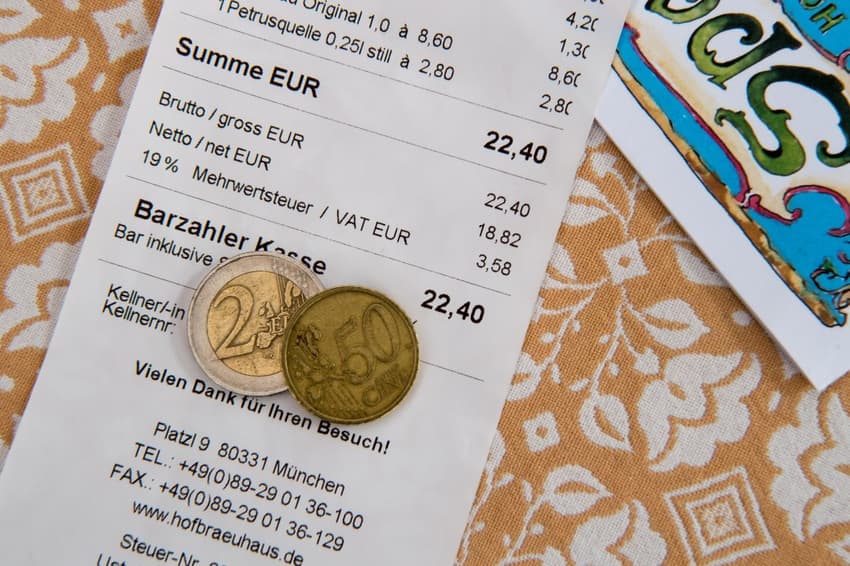Polite but not mandatory: The dos and don'ts of tipping in Germany

Every culture has its own unique customs and nuances when it comes to tipping - and Germany is no exception. The Local spoke to an etiquette expert to find out how to steer clear of faux pas.
We all know the feeling: you arrive in a new country, go out for a meal with a friend or colleague, and when the bill comes there's an awkward silence as you realise you're completely unsure how you should tip - and how much.
For those of us who are not mathematically inclined, totting up appropriate amounts of 'Trinkgeld' in our head can be daunting, especially if you're not sure what's considered polite and in what situations.
Should a hairdresser get a tip for a job well done, and how much should you give a porter for lugging a heavy suitcase up to your room at a hotel? Is five percent considered 'cheap' in a restaurant, or is this standard for run-of-the-mill service?
According to etiquette expert and communications consultant Nandine Meyden, there's a fair amount of personal choice involved when it comes to tipping in Germany - but it's important to know the ground rules nevertheless.
"The most important thing people have to know is that tipping isn’t mandatory in Germany, so you may tip people but you don’t have to," Meyden told Rachel Loxton on The Local's Germany in Focus podcast.
"So this is different from, for example, in the United States, where it’s really mandatory, when you go into a restaurant - you just have to tip. Here it’s up to you and it depends a little bit on the situation and how much money you have already spent in this situation."
In some cases - like a quick espresso at a local café - a simple "keep the change" will normally suffice, she adds.
In other situations, like a meal with friends or clients where you've requested a particular table, received good wine recommendations or required a complex order to cater to specific dietary requirements or allergies, not leaving a tip would definitely be considered "unfair", Meyden says - especially if you've received patient and friendly service.
What is considered a 'normal' tip?
Unlike in other countries where tips make up a larger share of a waiters' income, five to ten percent is considered a reasonable tip in Germany.
Within this remit, Meyden says, "it’s up to you to decide how much you want to acknowledge what the waiter did for you at the table".
As well the level of service, it's also worth factoring in the amount you've already spent on food and drink and how much communication you've had with the waiting staff.
"Of course, if you spent a lot of money, it would be nice to leave a little bit more to the waiter, but if you just had one pizza and a salad with a friend of yours - nothing special - and the waiter didn’t communicate that much with you, then something like five or six percent is absolutely fine," the etiquette expert explains.

Etiquette expert Nadine Meyden. Photo credit: Marcel Hasübert
Though waiters work hard and are often on modest wages, they don't get paid less than minimum wage in Germany - so the 15-20 percent that's normal in the United States is considered extremely generous in German restaurants.
As one local guide from holiday booking service Culture Trip puts it: "A 5 percent or 10 percent tip at a restaurant is appreciated while a 15 percent tip is considered very generous. Anything over that is simply American!"
That said, while larger tips are unusual, they are still welcomed by service staff - especially if the experience you've had has been truly outstanding.
Meyden compares it to attending a party thrown by a friend to mark a really special occasion, and bringing a slightly more expensive gift than you normally would.
"You can think the same when you go to restaurants: if someone performed outstandingly with you and you had a huge party there, of course it’s absolutely up to you to give more money if you’d like to."
READ ALSO: Trinkgeld: What you need to know about tipping culture in Germany
Is tap water a faux pas?
Beyond the amount of the tip, there are numerous other small practices to observe when it comes to being polite in a restaurant - or indeed in other service situations.
In general, people in Germany factor their tip into the amount they give the waiter when it's time to settle the bill. For example, you may give €50 to a waiter on a €45 bill and say, "Stimmt schon", which means: "That's fine" or "Keep the change".
This may be hard to get used to for people who are used to quietly leaving their tip on the table for the waiter to find later on.
However, Meyden says there's one primary example of a place where you'd be well within your rights to be more discreet about the amount you're leaving: particularly posh or high-end restaurants.
In these environments, you may find that your bill comes on a tray or in a small box, and you can leave the amount (including a tip) there before leaving.

A high-end cocktail bar. More expensive establishments will often be more discreet about bills and tips. Photo: picture alliance / dpa-tmn | Royal Caribbean Cruise Lines
And what are the social norms to observe when it comes to splitting the bill? Will you be considered a penny-pincher for insisting on only paying your share?
According to Meyden, this one's a little less clear-cut - but common-sense principles will generally apply.
If one or more members of the party aren't having starters or drinking wine, for instance, it would be fairer for everyone to cover their own food and drink, but in situations with friends who regularly go out to eat together, there's often little sense in quibbling over a euro or two.
Another issue that can confuse and even annoy foreigners is the difficulty of getting your hands on tap water in German restaurants - though Meyden explains that there's a reason behind this.
"What people have to know is that restaurants normally make their money from the drinks rather than the food, because the buying of the food, the processing of the food, the cooking of the food, is quite expensive," she says. "That's why it can be a little bit awkward in some restaurants if you do ask for tap water, but as far as I'm aware they'll bring it to you."
Once again, common sense comes into play here. Sitting at a table for two hours nursing a tap water could be considered quite rude ("I wouldn't do it," Meyden says) but if you're in a position where you're desperately short on cash and need somewhere to wait for a friend on a cold and rainy, you're unlikely to get thrown out for doing it. Just be prepared to bear one or two disapproving looks from the staff.
READ ALSO:
Where else should I tip?
Aside from restaurants, there are several other situations in Germany where tipping is customary - but not mandatory.
If you receive a great haircut or massage, enjoy your ride with a friendly taxi driver, get a meal delivered or go on an interesting guided tour (especially a "free" one), it's always nice to give a healthy tip or at least round up the bill.
Otherwise, extra services in hotels - like helping bring your luggage up to the room - should also be acknowledged with a little bit of Trinkgeld.
Of course, a simple journey up an elevator with a small travel suitcase can be rewarded with a euro or two, but a hotel porter who has to traverse at least one flight of stairs to help an entire family with their luggage deserves a more generous hand-out.

A woman enters a hotel room with her suitcase. Tipping porters often depends on how much assistance they provide. Photo: picture alliance/dpa/Getty Images/Cultura RF/PwC | Sofie Delauw
"I would be ashamed in a situation like that if I didn’t tip someone because it's a nice thing to do and often hotels don't employ people for these tasks anymore, so he may have had to close the reception to come up to the room with you," Meyden says.
"I think it’s sometimes up to us to create our future and how would we like to live together, so it’s kind of a luxury to have people bring our luggage and do things for us and we should really acknowledge that."
It may also come across as a little miserly if you're staying at a particularly high-end establishment and don't put aside some money for tips.
"You are staying in a luxury hotel and spending maybe €250 a night on a room, and you don’t have maybe one or two euros for somebody bringing your luggage?", says Meyden. "That’s something I can’t understand."
Comments
See Also
We all know the feeling: you arrive in a new country, go out for a meal with a friend or colleague, and when the bill comes there's an awkward silence as you realise you're completely unsure how you should tip - and how much.
For those of us who are not mathematically inclined, totting up appropriate amounts of 'Trinkgeld' in our head can be daunting, especially if you're not sure what's considered polite and in what situations.
Should a hairdresser get a tip for a job well done, and how much should you give a porter for lugging a heavy suitcase up to your room at a hotel? Is five percent considered 'cheap' in a restaurant, or is this standard for run-of-the-mill service?
According to etiquette expert and communications consultant Nandine Meyden, there's a fair amount of personal choice involved when it comes to tipping in Germany - but it's important to know the ground rules nevertheless.
"The most important thing people have to know is that tipping isn’t mandatory in Germany, so you may tip people but you don’t have to," Meyden told Rachel Loxton on The Local's Germany in Focus podcast.
"So this is different from, for example, in the United States, where it’s really mandatory, when you go into a restaurant - you just have to tip. Here it’s up to you and it depends a little bit on the situation and how much money you have already spent in this situation."
In some cases - like a quick espresso at a local café - a simple "keep the change" will normally suffice, she adds.
In other situations, like a meal with friends or clients where you've requested a particular table, received good wine recommendations or required a complex order to cater to specific dietary requirements or allergies, not leaving a tip would definitely be considered "unfair", Meyden says - especially if you've received patient and friendly service.
What is considered a 'normal' tip?
Unlike in other countries where tips make up a larger share of a waiters' income, five to ten percent is considered a reasonable tip in Germany.
Within this remit, Meyden says, "it’s up to you to decide how much you want to acknowledge what the waiter did for you at the table".
As well the level of service, it's also worth factoring in the amount you've already spent on food and drink and how much communication you've had with the waiting staff.
"Of course, if you spent a lot of money, it would be nice to leave a little bit more to the waiter, but if you just had one pizza and a salad with a friend of yours - nothing special - and the waiter didn’t communicate that much with you, then something like five or six percent is absolutely fine," the etiquette expert explains.

Though waiters work hard and are often on modest wages, they don't get paid less than minimum wage in Germany - so the 15-20 percent that's normal in the United States is considered extremely generous in German restaurants.
As one local guide from holiday booking service Culture Trip puts it: "A 5 percent or 10 percent tip at a restaurant is appreciated while a 15 percent tip is considered very generous. Anything over that is simply American!"
That said, while larger tips are unusual, they are still welcomed by service staff - especially if the experience you've had has been truly outstanding.
Meyden compares it to attending a party thrown by a friend to mark a really special occasion, and bringing a slightly more expensive gift than you normally would.
"You can think the same when you go to restaurants: if someone performed outstandingly with you and you had a huge party there, of course it’s absolutely up to you to give more money if you’d like to."
READ ALSO: Trinkgeld: What you need to know about tipping culture in Germany
Is tap water a faux pas?
Beyond the amount of the tip, there are numerous other small practices to observe when it comes to being polite in a restaurant - or indeed in other service situations.
In general, people in Germany factor their tip into the amount they give the waiter when it's time to settle the bill. For example, you may give €50 to a waiter on a €45 bill and say, "Stimmt schon", which means: "That's fine" or "Keep the change".
This may be hard to get used to for people who are used to quietly leaving their tip on the table for the waiter to find later on.
However, Meyden says there's one primary example of a place where you'd be well within your rights to be more discreet about the amount you're leaving: particularly posh or high-end restaurants.
In these environments, you may find that your bill comes on a tray or in a small box, and you can leave the amount (including a tip) there before leaving.

And what are the social norms to observe when it comes to splitting the bill? Will you be considered a penny-pincher for insisting on only paying your share?
According to Meyden, this one's a little less clear-cut - but common-sense principles will generally apply.
If one or more members of the party aren't having starters or drinking wine, for instance, it would be fairer for everyone to cover their own food and drink, but in situations with friends who regularly go out to eat together, there's often little sense in quibbling over a euro or two.
Another issue that can confuse and even annoy foreigners is the difficulty of getting your hands on tap water in German restaurants - though Meyden explains that there's a reason behind this.
"What people have to know is that restaurants normally make their money from the drinks rather than the food, because the buying of the food, the processing of the food, the cooking of the food, is quite expensive," she says. "That's why it can be a little bit awkward in some restaurants if you do ask for tap water, but as far as I'm aware they'll bring it to you."
Once again, common sense comes into play here. Sitting at a table for two hours nursing a tap water could be considered quite rude ("I wouldn't do it," Meyden says) but if you're in a position where you're desperately short on cash and need somewhere to wait for a friend on a cold and rainy, you're unlikely to get thrown out for doing it. Just be prepared to bear one or two disapproving looks from the staff.
READ ALSO:
Where else should I tip?
Aside from restaurants, there are several other situations in Germany where tipping is customary - but not mandatory.
If you receive a great haircut or massage, enjoy your ride with a friendly taxi driver, get a meal delivered or go on an interesting guided tour (especially a "free" one), it's always nice to give a healthy tip or at least round up the bill.
Otherwise, extra services in hotels - like helping bring your luggage up to the room - should also be acknowledged with a little bit of Trinkgeld.
Of course, a simple journey up an elevator with a small travel suitcase can be rewarded with a euro or two, but a hotel porter who has to traverse at least one flight of stairs to help an entire family with their luggage deserves a more generous hand-out.

"I would be ashamed in a situation like that if I didn’t tip someone because it's a nice thing to do and often hotels don't employ people for these tasks anymore, so he may have had to close the reception to come up to the room with you," Meyden says.
"I think it’s sometimes up to us to create our future and how would we like to live together, so it’s kind of a luxury to have people bring our luggage and do things for us and we should really acknowledge that."
It may also come across as a little miserly if you're staying at a particularly high-end establishment and don't put aside some money for tips.
"You are staying in a luxury hotel and spending maybe €250 a night on a room, and you don’t have maybe one or two euros for somebody bringing your luggage?", says Meyden. "That’s something I can’t understand."
Join the conversation in our comments section below. Share your own views and experience and if you have a question or suggestion for our journalists then email us at [email protected].
Please keep comments civil, constructive and on topic – and make sure to read our terms of use before getting involved.
Please log in here to leave a comment.